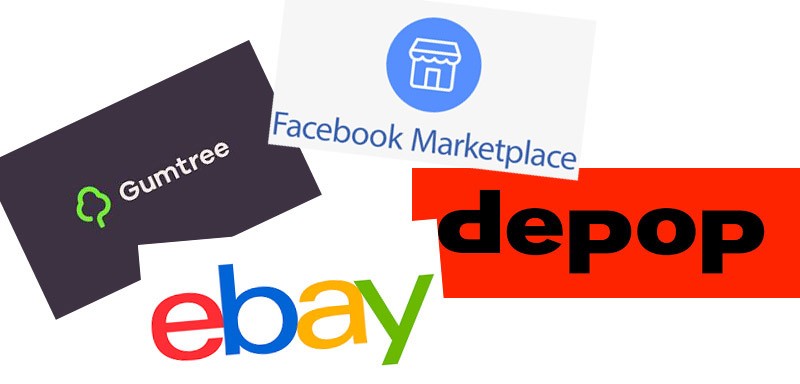
Want to sell your belongings online? I need to preface this by saying: it may not be worth as much as what you think.
Temu, Shein and Kmart are great. I mean who doesn’t want a $2 forest green velour cushion or $10 mum jeans delivered in 3 days? But this race to the bottom devalues everything. People expect to get new cool stuff quite cheaply, so they are less likely to pay big bucks for yours.
So then why sell unwanted stuff online?
- It all adds up. $10 here, $15 there. Once you are familiar with the platforms, advertising is fast and easy and you can whip up 10 listings in no time.
- To avoid landfill. Re-use is the ultimate form of recycling.
- It’s fun. There is something addictive about having your stuff ‘chosen’. It’s the equivalent of the buyer swiping right.
- It’s an integral part of decluttering. Seeing your items go to a willing recipient makes the decluttering process productive.
Sell unwanted stuff online – the downsides
- It’s time-consuming. If you are spending an hour to earn $10, this may not be a good use of your time.
- There are scammers. Especially on Marketplace and Gumtree.
- It’s frustrating. People ask the darndest things. Like “where are you located?”, over and over. Um it’s in the listing sir.
- People are unreliable. After staying up for over an hour for someone to pick up a $5 chair as promised, you’ll soon realise that the good intentions of a stranger are not enough.
Sell unwanted stuff online – what are my options?
There are lots of selling platforms that I have never used including Craigslist, Trading Post and various smaller sites. I am also aware that Facebook groups are brilliant for selling niche items like antiques and collectibles. The four below are just the ones I have used the most.
For buyers and introverts it’s fantastic. Lots to choose from, excellent infrastructure, buyer protection and dispute procedures. Listings are comprehensive and the rating system is pretty solid.
But the seller is often left scratching their head at the cheeky fees (10% and rising) and the detail required in the listings.
It’s time-consuming to get the listing right, but if you do, the audience is wide. And you can research selling prices so you know what to expect, with eBay’s excellent search functionality. This is a terrific starting point to figure out whether it’s worth listing your broken iPhone 4 in the first place. (um, no). Aiming to sell unwanted stuff online is one thing – finding a market for it is another.
eBay favours contactless transactions, so get ready to go to the post office to post your item, and I hope it’s not a dining table.
Pros for sellers: Streamlined, high visibility, safe, professional, impersonal. Also you can research the item before selling.
Cons for sellers: Time consuming, expensive.
Pro tip: Be prepared to post items and get a tracking number.
It’s over 20 years old and has an Australian spirit, even though it actually originated in London for Aussie, New Zealand and South African expats. It was bought out by eBay in 2005 and is now owned by The Market Herald.
Gumtree is easy to use and pretty forgiving. It’s free to buy and sell unless you boost your listing. (Does anyone actually do that?) Things move slowly though. Gumtree is the grandpa of selling, with a slow, comfortable gait and not much momentum.
Pros for sellers: Easy, free, can cross-promote to eBay.
Cons for sellers: Slow, limited reach. Scammers ahoy.
Pro tip: Be patient.
The relative newcomer on the block for unique and vintage clothing. And vintage can mean something bought in 2005 (feel old yet?) Easy to use but it gets a lot of its vibe from online retail and social media, therefore relies on building followers for visibility. One for the youngsters and Insta-savy among us.
Pros for sellers: Streamlined, marketable, fun, creative.
Cons for sellers: A bit too young and niche for me.
Pro tip: Research your market and build a following.
A modern version of Gumtree. Wins the race for ease of use combined with zero cost. You’ll have people knocking on your door right away, especially if it’s a weekend. It’s much more local than eBay, meaning postage is not a hassle and big items are easy to shift fast.
However, the inconvenience of stamps is replaced by tyre kickers who may or may not show up as promised. The haggling is fierce, so factor that into your asking price or practise your firm stance. Also there are lots of scammers, but if you follow the basic rule of not releasing anything until the money is in your account or your hand, you should be good.
Running multiple listings can become hectic, so have a spreadsheet or some sticky notes on hand to record what’s going on with your listings.
The rating system is quite buried, so it’s the Wild West of selling. Sometimes after I am caught up in the excitement of selling, I am left wondering why I have just told my address to a stranger for the sake of $7.50. And also let them know that nobody will be home next weekend. Oops.
Also whenever I log on to check or upload a listing, I am pulled into a reel of recommendations and find myself coveting rather than decluttering. What’s in it for Facebook and why is it free to use? I suspect it’s data mining. Oh well, sign me up. I have already sold my soul to the devil 100 times over.
Pros for sellers: Highly visible, fast-paced, responsive.
Cons for sellers: Plenty of scammers, but they are not hard to spot. Can feel a bit sketchy (I only give out my address after payment, or if pickup is imminent). It is also time consuming, hectic, and items do not relist automatically, so check in with them.
Pro tip: If you price items too high, inactivity and the algorithm will reduce visibility a lot. Basically nobody clicks and Facebook decides your item isn’t worthy of attention. You are better off pricing your items lower to get a hustle vibe.
Sell unwanted stuff online – conclusion
The amateur seller will find Marketplace the best bang for buck. It’s a bit lawless but it does the job, especially for sellers. eBay is good for small, post-worthy items you want a broad market for.
Leave Depop for the teenagers and Gumtree for grandad.
If you want a deep dive into eBay and Marketplace, we have you covered.
And get in touch for further decluttering help.






























